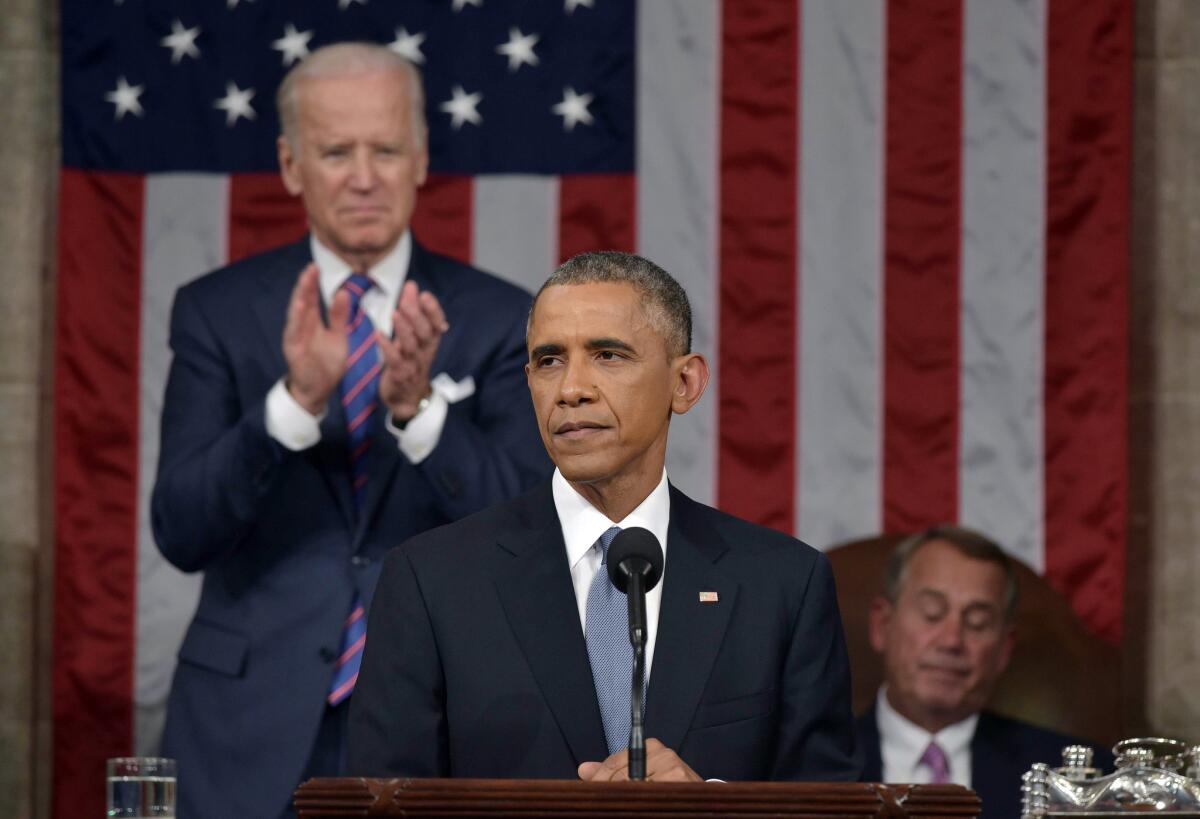In his final State of the Union address, Obama seeks to stay relevant

President Obama delivers his State of the Union address to a joint session of Congress in 2015.
- Share via
Reporting from Washington — Speaking to Democratic donors recently in his hometown of Chicago, President Obama took some delight in recalling how long it had been since someone reminded him he was a “lame duck” president.
“We’ve been flapping our wings a lot,” he said, noting a Pacific Rim trade agreement, a deal to rein in Iran’s nuclear program, positive economic trends and new actions on climate change.
In that spirit, White House officials have said for weeks that Obama’s final State of the Union address Tuesday will be a “non-traditional speech.” That’s a well-worn line from second-term administrations entering their final year as they try to stay relevant in the national debate.
The relatively early date for the president’s annual address to Congress is indicative of the need to avoid being overshadowed by the campaign to succeed Obama, with the Iowa caucuses less than three weeks away. But Obama and his team nonetheless see a rare opportunity for the president to not just be part of the 2016 debate, but to set its terms.
“This one moment where the country sort of acknowledges that the president gets an hour to assess the condition of the country and to offer up a prescription for confronting the challenges and capitalizing on the opportunities is as important as ever,” White House press secretary Josh Earnest said Monday.
SIGN UP for the free Essential Politics newsletter >>
Hoping to amplify the president’s argument to the country, the White House has tried to make the State of the Union address more than just a speech in the House chamber. It’s the launching pad for Snapchat messages, YouTube forums, and yes, even some good old-fashioned barnstorming.
The speech itself, aides say, will be built around one central theme of optimism, as the president seeks to highlight the progress he sees the nation having made since he first took office at the height of the Great Recession, and what more can be done to leverage the strengths of the American people in the future.
“There is no country in the world that is better positioned to capitalize on the kind of opportunities we see, whether it relates to our national security or it relates to our economy, than the United States of America,” Earnest said.
It’s not clear that the country shares the president’s positive view of the state of the nation. A Fox News poll released last week found that 61% of Americans were not satisfied with how things were going in the country, the highest number in two years. But Earnest attributed that in part to the “avalanche of negativity” from the Republicans looking to take his place.
“The willingness of those candidates to exploit people’s fears and insecurities and anxieties has infected the political debate,” he said.
Throughout the week, the White House will be working to remind Americans of what the president has accomplished since taking office, while pointing to 2016 as the year to “push a bunch of big pieces over the finish line in the next year,” as one official, who was not authorized to speak publicly in advance of the president’s speech, put it. That includes closing the military detention center in Guantanamo Bay, Cuba, giving final approval to the proposed Trans Pacific Partnership trade deal, and enacting reforms to the criminal justice system.
Those priorities ensure that even as the tumultuous presidential race dominates the nation’s attention, the candidates will spend “a lot more time responding to us” than the other way around, as the official put it.
Whether it’s to his party’s political benefit or detriment is unclear. When Obama first addressed Congress in 2009, Democrats dominated both the House and what was briefly a 60-seat supermajority in the Senate. On Tuesday, he speaks to the largest Republican House majority in generations, one built largely through midterm election years when Obama’s agenda was deeply unpopular.
But the story has been different in presidential election years, as Obama reminded lawmakers in his 2015 State of the Union address.
“I have no more campaigns to run,” he said then, drawing some sarcastic cheers. “I know because I won both of them.”
Follow @mikememoli and @cparsons on Twitter for more news out of Washington.
Join the conversation on Facebook >>
ALSO
Clinton and Sanders take aim while O’Malley seeks spotlight
Poll shows majority in West opposes giving states control over federal land
Supreme Court appears skeptical of union fees -- a potentially major loss for labor groups
More to Read
Sign up for Essential California
The most important California stories and recommendations in your inbox every morning.
You may occasionally receive promotional content from the Los Angeles Times.















